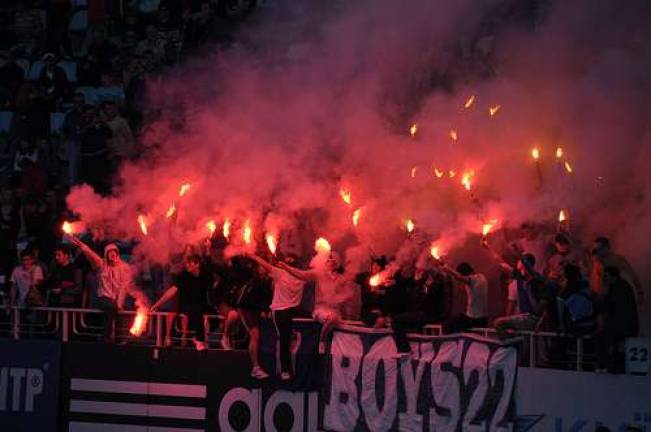Is the Euro 2012 Cup Plagued by Fears of Racism?

Euro 2012 host countries Poland and Ukraine find themselves under close scrutiny as racism accusations intensify. The Union of European Football Association (UEFA) has already opened several investigations as we approach the second week of the competition. The controversy was sparked last month with BBC's "Stadiums of Hate," a documentary denouncing the presence of racist and neo-nazi groups among soccer fans in both Ukraine and Poland, the two countries chosen to host the prestigious Euro 2012. Among others, the documentary featured British soccer veteran Sol Campbell, saying the following about the competition: "Stay at home. Watch it on TV. Don't even risk it [because you could end up coming back in a coffin](http://www.bbc.co.uk/news/uk-18192375)." Other black British players, such as Theo Walcott and Alex Chamberlain, have asked their families to follow Campbell's advice and remain at home, while many began to question the two host countries' ability to keep players and supporters safe. British authorities even called on supporters traveling to these countries to be careful, especially after [Sky News reported that a group of Ukrainian hooligans had issued official threats](http://news.sky.com/home/world-news/article/16228209) to British fans. Polish and Ukrainian officials have reacted strongly to the accusations, claiming that the media have largely exaggerated on the situation. "There is a problem with racism and anti-semitism in Poland," acknowledged Polish Foreign Ministry spokesman Marcin Bosacki, "but it is blown out of every single proportion in this material." UEFA President and ex-French soccer player Michel Platini was of the same opinion, stating that there isn't "any more racism in Poland and Ukraine than in France or anywhere else." He went on to add that racism was a problem rooted in social issues, and that sports should be seen as a part of the solution rather than a cause of the problem. The BBC documentary has been heavily criticized on the grounds that it attempted to sensationalize the issue by blowing it out of proportion. While it is true that extreme-right ideologies are currently on the rise in Europe, racism in soccer is by no means confined to ex-Soviet countries. In fact, the British Premier League has recently had its own problems, as Liverpool forward Luis Suarez was found guilty of racist insults towards French Senegalese player Patrice Evra in October 2011, collecting an 8-match ban and a $60,000 fine. Chelsea's John Terry is also currently undergoing trial for similar accusations. Regardless of whether BBC's "Stadiums of Hate" was simply pouring oil on the fire, Ukraine and Poland will certainly find themselves under close scrutiny until the end of the tournament. The UEFA has already begun investigating several cases pertaining to racist behavior in the stands, including Sunday's incident during the Spain ? Italy game, where about 200 Spanish fans allegedly directed monkey chants at black Italian player Mario Balotelli. Police had to intervene yesterday after a particularly bloody clash between Polish and Russian supporters in Warsaw, but the incident seemed more influenced by the tumultuous history of the two countries than by racist sentiments. For Ukraine, the stakes seem higher than a simple game of football. Several European politicians have been pressuring the Ukrainian government to release former Prime Minister and opposition leader Yulia Tymoshenko, who was arrested last October on charges of abuse of power. The Euro Cup could be a chance for Ukraine to redeem itself in the eyes of Europe, if things go well. In the meantime, Ukrainian fans will certainly have enjoyed Monday's 2-1 win against Sweden. by Laurent Berstecher